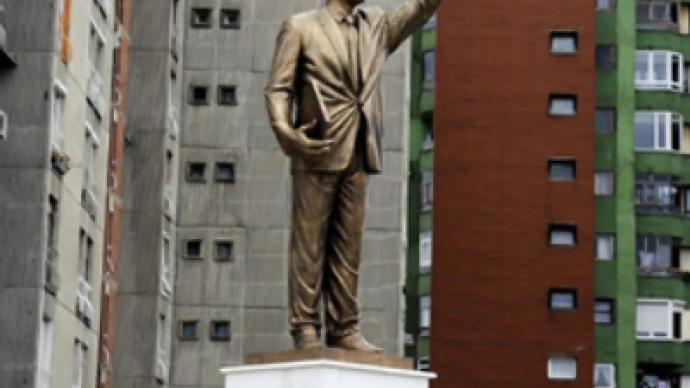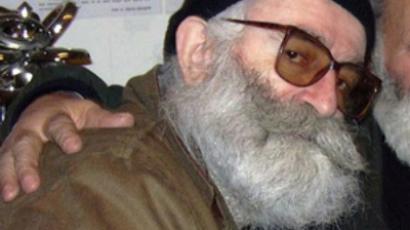Clinton unveils statue to (guess who?) in Kosovo

Albanians on Sunday jammed into Pristina’s main square to welcome Bill Clinton, the guest of honor at his statue-unveiling ceremony commemorating the former US president's role in the Yugoslavian war of 1999.
“I never expected that anywhere, someone would make such a big statue of me,” Clinton told the cheering crowd after removing a red cover over the monument, revealing a bronze likeness of himself, thus proving that not all commissioned works of art are awarded posthumously.
Clinton’s live appearance next to his larger-than-life metal replica is the latest effort by Kosovo – which is commemorating the 10-year anniversary of NATO’s war against Yugoslavia – to attract international attention to its quest for formal independence.
Kosovo unilaterally declared its independence from Serbia last year, but Serbia has vowed never to recognize the statehood of the breakaway territory. Meanwhile, the province continues to be administered by NATO forces.
The visiting former US president then drew attention to his wife Hillary Clinton, the U.S. Secretary of State.
“This morning when I talked to my wife, she said I had to make a photograph in front of it [the statue] and send it to her to make sure it was true and I didn’t make the whole thing up.”
The bronze statue, which stands 3.5 meters (11 feet), depicts the former American president with his left arm raised while holding documents bearing the date when NATO launched its aerial bombardment of Yugoslavia – 24 March, 1999 – a date that lives in infamy for some and in victory for others.
The statue sits in front of an unremarkable apartment complex on, you guessed it, Bill Clinton Boulevard.
Not everybody jubilant
On March 24, 1999, NATO – and without full consent of the UN Security Council – launched an attack on the government of Yugoslavian President Slobodan Milosevic over claims of heavy-handedness against Kosovo’s majority Albanians.
In the moments leading up to the NATO attack, Bill Clinton was fighting for his political life amidst an embarrassing sex scandal involving a young intern named Monica Lewinsky; scoring an easy victory in Yugoslavia was one way to divert public attention away from the scorching issue. Thus, Clinton's refusal to authorize ground troops in and around Kosovo.
In other words, by relying solely on an aerial bombardment to “liberate” Kosovo, the US president was guaranteed a big political win with minimal losses for US troops, not to mention being handed a golden opportunity for giving a "purpose" for NATO, an organization that many argue has outlived its function and utility.
Over the course of the 10-week conflict, NATO aircraft flew over 38,000 combat missions; even the German Luftwaffe had its first taste of combat in the skies over Yugoslavia since having its wings clipped in World War II.
The ensuing 78-day aerial bombardment campaign, which grew continuously more aggressive and reckless, spared little infrastructure: factories, bridges, roads and power stations were all bombed with deadly accuracy. As a result, thousands of innocent civilians suffered great deprivation on both sides of the battle.
The Cold War military bloc even knocked out Serbia’s state television broadcasting tower, which observers point to as a direct breach of Geneva Convention rules, which provides for the ability of combatants to have the freedom to “express themselves” in wartime.
Despite NATO pledges that the war would be “a clean one,” the aerial campaign proved that a military strategy of “surgical strikes” can never be implemented without fatal flaws.
In perhaps the worst public relations disaster for NATO during the conflict, five US “smart” bombs severely damaged the Chinese Embassy in Belgrade, killing three Chinese journalists. NATO officials, in an effort to cool Chinese outrage, blamed the error on outdated maps. Beijing rejected both the apologies and explanations.
About the same time, a NATO fighter jet, believing it had discovered a Yugoslav military convoy, hit a bus carrying Albanian refuges instead, killing 50 civilians.
Even the Albanians, the very ethnic group NATO claimed to be defending, suffered from the all-too-frequent misguided smart bomb. It has been estimated that about 200 Kosovo civilians were indiscriminately killed by NATO forces, while Human Rights Watch was able to verify 500 civilian deaths in Yugoslavia (that is, outside Kosovo).
The hostilities came to an end on June 10, 1999 when Milosevic accepted the conditions of surrender.
Needless to say, NATO's “illegal” bombing campaign – the first military conflict in the organization's history – sparked an outpouring of international criticism, and was especially unpopular in Russia where talk of defending the “Slavic brotherhood” filled the air.
Tensions spilled over at the end of March 1999 when a gunman driving a stolen vehicle attempted to fire a grenade launcher at the US embassy in Moscow during a public protest of the facility. Then-president Boris Yeltsin ordered an investigation into the incident and three men were later arrested.
What next for Kosovo?
Some people are wondering why Kosovo chose this particular moment to dedicate a public memorial to a still living, breathing, former American president. After all, such honorable public works are usually paid posthumously.
One good reason is that Kosovo is presently fighting something of a public relations war against Serbia in its bid for independence. In other words, Bill Clinton may very well live longer than an independent Kosovo.
Although the United States and a number of other western countries have supported Kosovo’s claims to independence, other countries, including China, India and Russia, continue to regard Kosovo as an integral part of Serbia.
Russia announced that it will support Serbia’s case in an upcoming UN court hearing on the legitimacy of Kosovo’s declaration of independence, Foreign Minister Sergey Lavrov announced last month.
“We will insist that international law and UN Security Council decisions be respected and any unilateral decisions running counter to the UN Charter and OSCE principles be avoided,” Lavrov said following talks with his Serbian counterpart, Vuk Jeremic.
Belgrade brought Kosovo’s unilaterally declared independence to the UN’s International Court of Justice in The Hague where a case will open on Dec. 1.
Remembering the Pristina dash
In the context of the Yugoslavian war, Russians will always remember Pristina for something else besides a bronze tribute to the former American president Bill Clinton, for Pristina is the place where Russia staked everything on securing a peacekeeping sector for itself outside of NATO command.
On June 11-12, about 200 Russian SFOR troops stationed in Bosnia made a spectacular dash through Belgrade into Kosovo after Serbian troops began their withdrawal and, more importantly, after Russia got the word that it would not receive its own peacekeeping sector.
The result was that Russia, much to the consternation of NATO leaders (most notably, US General Wesley Clark who, upon ordering the British to block the approaching Russian tanks, was famously told by British General Michael Jackson, "I will not start World War III for you.") became the first official peacekeeping force in Kosovo – ahead of advancing NATO troops. The audacious gesture reinforced Russia’s image as Serbia’s eternal “blood ally” that will always be there through good times or bad.
And perhaps even longer than a bronze statue in the public sqaure.
.













